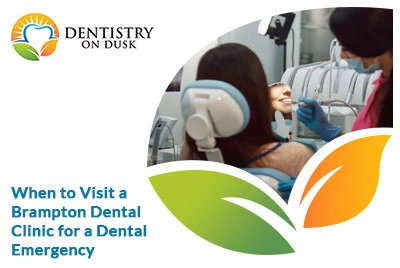
Brampton’s Top Dentists Help You Manage Sensitive Teeth
Tooth sensitivity, also referred to as dentin hypersensitivity, is a common dental condition that can significantly impact your day-to-day life. This discomfort typically manifests as a sudden, sharp pain when teeth are exposed to certain triggers, such as hot or cold foods/beverages, sweet or acidic substances, and even cold air. In this post, we discuss the causes of tooth sensitivity and explore the key role dentists in Brampton play in both reducing symptoms and implementing preventive care measures. Let’s get started.How to Deal with Tooth Sensitivity: Guide by Brampton’s Dentists of Leading Dental Clinic
Here are the main causes of tooth sensitivity, as suggested by a leading dental office in Brampton. We also discuss the key role our dentists can play in reducing symptoms as well as employing preventive care.What Are the Causes of Tooth Sensitivity?
Here are the key causes of sensitive teeth:A. Enamel Erosion
Tooth enamel can erode when you consume acidic foods and beverages, such as carbonated beverages and citrus fruits. The acids gradually wear away the protective enamel of teeth, exposing the sensitive dentin underneath. Gastroesophageal Reflux Disease (GERD), a digestive disorder, can lead to acid reflux, affecting the enamel and subsequent tooth sensitivity. Abrasion and attrition from environmental factors, such as aggressive brushing or chewing hard objects, can lead to enamel wear and dentin exposure. (Dentin, also known as dentine, is a layer of substance situated directly beneath the tooth enamel.)B. Gum Recession
Periodontal disease, characterized by inflammation and infection of the gums, can lead to the recession of gum tissue. As gums pull away from the teeth, the roots become exposed, increasing sensitivity. Vigorous brushing can accelerate gum recession, exposing the sensitive areas of the teeth, including enamel, and leading to sensitivity of teeth. Adopting gentler brushing techniques is crucial to preventing further recession. As we age, natural changes in our gums can lead to them receding, making older adults more prone to tooth sensitivity.C. Tooth Decay
Untreated cavities can extend into the dentin, causing tooth sensitivity. Cracks in the teeth can expose the dentin and contribute to sensitivity.D. Dental Procedures
While teeth whitening can make your teeth look good, it can also temporarily increase tooth sensitivity. Using desensitizing products before and after whitening can mitigate this side effect. Certain dental restoration procedures, such as crowns or bridges, may contribute to sensitivity. Your dentist will assess and address these issues during the restoration process.Why Professional Help from Our Brampton Dental Clinic Is a Good Idea
 Let’s find out how our dentists in Brampton and the treatments they offer can reduce tooth sensitivity. We also discuss how oral care and lifestyle changes can be helpful.
Let’s find out how our dentists in Brampton and the treatments they offer can reduce tooth sensitivity. We also discuss how oral care and lifestyle changes can be helpful.
A. What Is the Role of Brampton Dentists in Curing Tooth Sensitivity?
Our dentists conduct thorough exams to identify the root causes of your tooth sensitivity. This includes assessing your enamel, gums, and which restoration procedure is best. Advanced diagnostic tools like X-rays and imaging help dentists visualize internal structures, aiding in the accurate diagnosis of the issues contributing to your sensitivity.B. Treatment Options
Desensitizing toothpaste typically contains compounds like potassium nitrate or strontium chloride, which form a protective barrier on the dentin. Regular use can significantly reduce sensitivity over time. Professional fluoride treatments strengthen enamel, reducing sensitivity. Fluoride can be applied in-office or prescribed for home use. Dental sealants, often used in preventing cavities, can also be beneficial for managing sensitivity. Applied as a thin, protective coating, sealants fill in microscopic pits and fissures, shielding the enamel from external irritants. Addressing cavities or damaged areas with restorative procedures can eliminate the source of sensitivity and restore tooth structure. In situations where the existing tooth structure is insufficient for a standard filling, inlays and onlays are employed to achieve enhanced strength. The distinction lies in their application: an inlay is positioned within a tooth cavity, whereas an onlay replaces the cusp or cusps (tips) of the tooth. This approach ensures a more robust and durable solution. Gum grafting involves taking a small piece of tissue from another part of the mouth or using a donor source to cover exposed roots. This surgical procedure helps reduce sensitivity by protecting the roots and promoting gum tissue regeneration.C. Lifestyle and Oral Care Recommendations
Educating patients on proper brushing techniques, including gentle circular motions, helps prevent enamel and gum damage. As mentioned, using a toothbrush with soft bristles is important in managing tooth sensitivity. Toothpaste designed for sensitive teeth contributes to effective oral care. The journey to overcoming tooth sensitivity involves collaboration between you and your dentist, with preventive measures paving the way for a brighter, pain-free oral future. By staying informed, practicing good oral hygiene, and seeking professional guidance, we can collectively unmask the mystery of your tooth sensitivity and make dental discomfort a thing of the past. To learn more about denture treatments, including sensitive tooth care, contact Dentistry on Dusk. Our family dentists provide top-quality and effective service at competitive rates in Brampton.Request an Appointment
Popular Blogs
Recent Posts

Classification of a Natural Smile in Cosmetic Dentistry: Understanding Smile Types and Designs
A smile is one of the most powerful expressions we share—it reflects confidence, emotion, and personality. In cosmetic dentistry, understanding the classification of a natural smile is essential for creating results that look balanced, authentic, and... Read More...

When to Visit a Brampton Dental Clinic for a Dental Emergency
Dental problems can start suddenly or build slowly over time. Sometimes the pain is sharp and immediate, while other times it feels mild but keeps coming back. Many people feel confused about when a dental issue is serious and when it can wait. This ... Read More...

How a Brampton Family Dentist Can Reduce the Psychological Impact of Crooked Teeth
Crooked teeth are often seen as only a cosmetic issue, but they can affect much more than your smile. Many people, including children and adults, live with emotional stress because of teeth that are not straight. These feelings often start quietly an... Read More...

